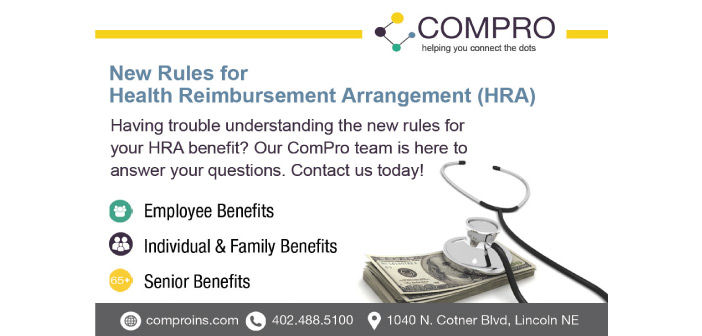2020 Health Reimbursement Arrangements – New Rules
Health Reimbursement Arrangements (HRA) have historically been a group benefit offered by a small employer that reimburses the employee for certain health care expenses. An example would be a reimbursement offered to pay half of the deductible on a health insurance policy. It could not be used to pay for insurance premiums. The HRA is funded by the employer and is a deductible expense. The reimbursement to the employee is not a taxable item.
Many small employers do not offer group health insurance but would like to be able to offer some reimbursement toward the cost of individual health insurance premiums. Under current tax laws, the only allowable way to do this is to increase the employee’s wages. This increase is fully taxable to the employee.
The rules have been expanded and will go into effect on January 1, 2020. An ICHRA—Individual Coverage Health Reimbursement Arrangement—can be offered by an employer to reimburse employees for individual health insurance premiums; including Medicare plans. The reimbursement will not be taxable to the employee.
Here are some of the guidelines for the new ICHRA:
- An employer may not offer a group health plan and an ICHRA to the same class of employees. There are many ways to classify employees—full-time, part-time, salaried, hourly, seasonal, geographically by work site, etc.
- There is no contribution limit for the employer.
- An employee that is participating in an ICHRA may NOT be eligible to receive a Premium Tax Credit from healthcare.gov. It will be subject to the affordability and minimum value rules of the ACA. Individuals must be given an opportunity each year to opt-out of the ICHRA.
- ICHRAs can be designed to be HSA compatible.
- ICHRAs can not be used for short-term limited duration plans.
- ICHRA can be used for coverage under Medicare Parts A, B, C, D, and Medicare Supplements.
- A Special Enrollment Period will be recognized for someone that gains or loses access to an HRA integrated with individual health insurance coverage. An employee and their dependents will be allowed to enroll or change their individual health insurance coverage.
The final rules were released in June, 2019. This is an overview of some of the highlights. As we move closer to Open Enrollment, additional information will be available. An ICHRA plan may be a good option when your employees are responsible for their own health insurance, but don’t typically qualify for a Premium Tax Credit. Contact ComPro or your professional health insurance agent to discuss your questions.


